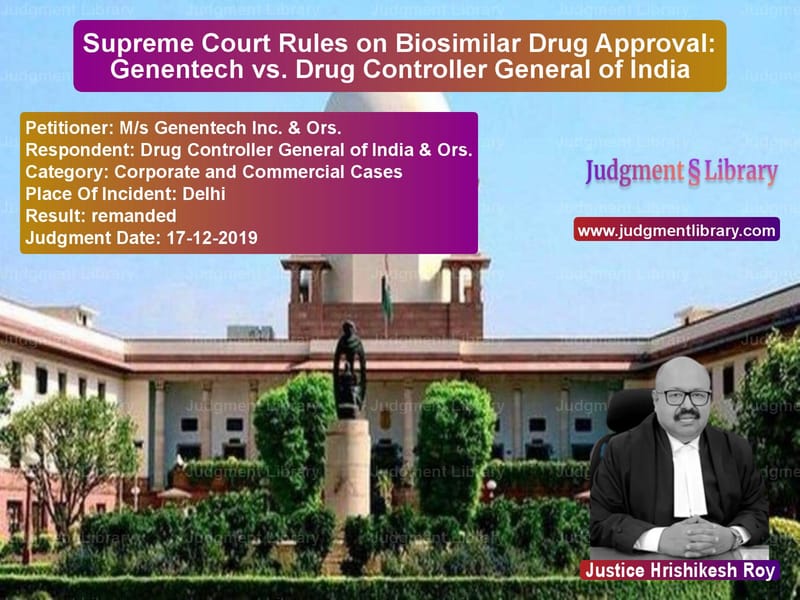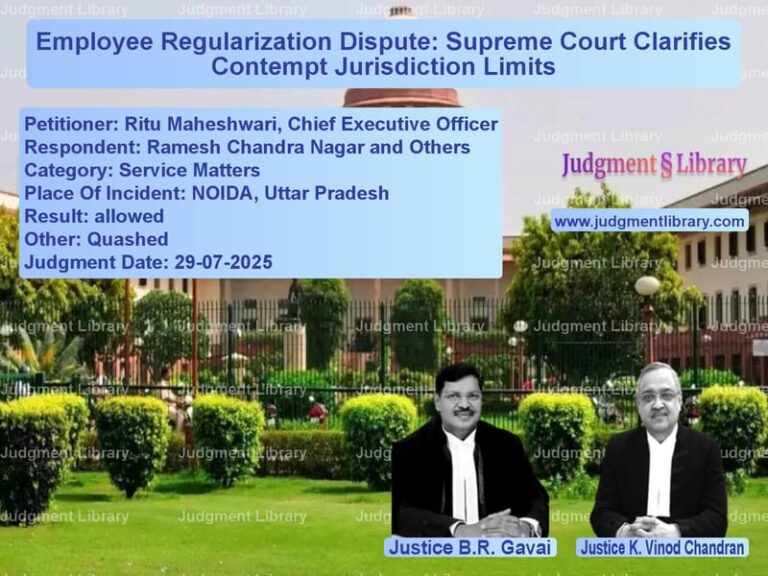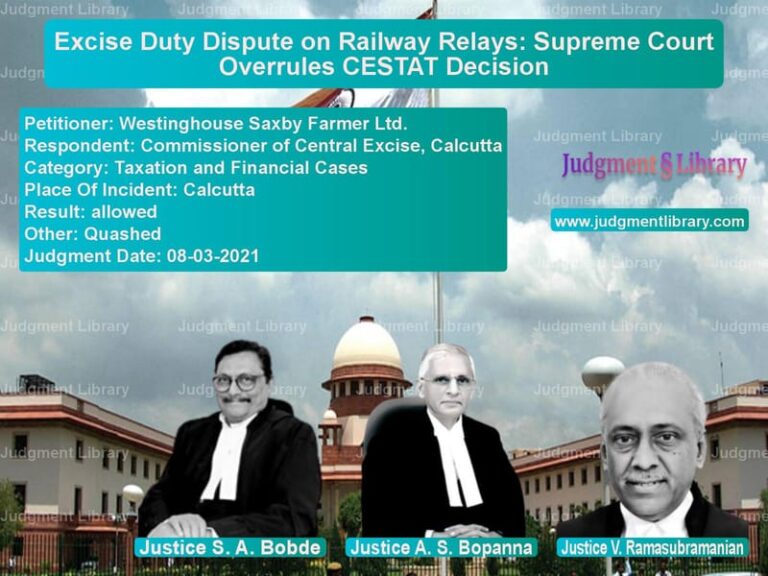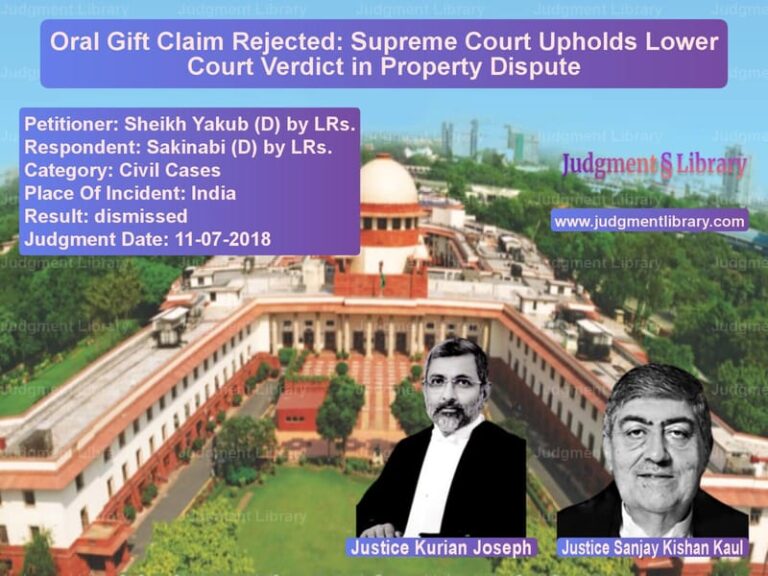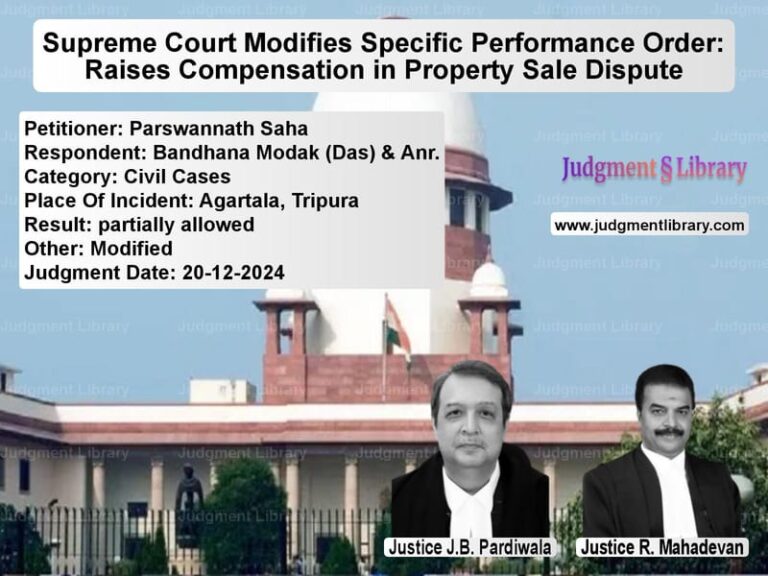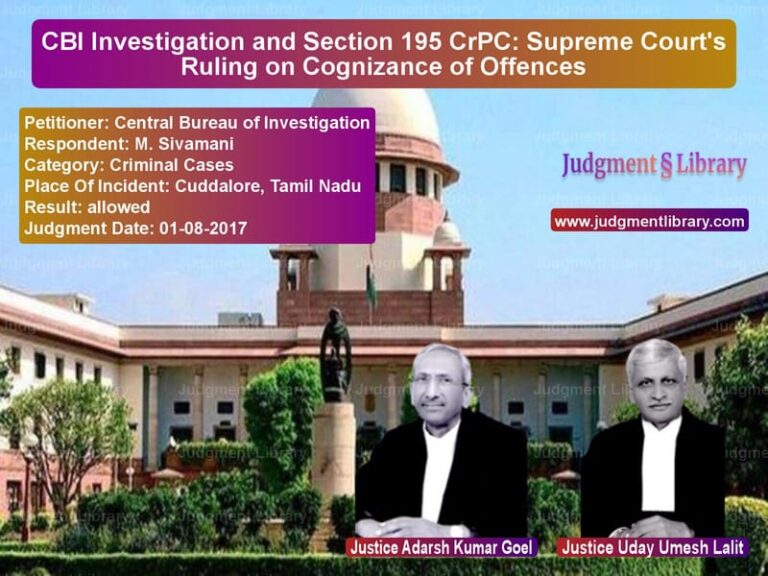Supreme Court Rules on Biosimilar Drug Approval: Genentech vs. Drug Controller General of India
The Supreme Court, in M/s Genentech Inc. & Ors. vs. Drug Controller General of India & Ors., ruled on an important issue regarding the approval process for biosimilar drugs and the legal rights of original drug manufacturers. This case involved the drug Trastuzumab, a monoclonal antibody used in cancer treatment, and the dispute over its biosimilar counterpart, TrastuRel.
Background of the Case
M/s Genentech Inc., along with Roche Products (India) Pvt. Ltd. and F. Hoffmann-La Roche AG (the appellants), are the original manufacturers of Trastuzumab, which they market in India under the brand names HERCEPTIN, HERCLON, and BICELTIS. The appellants had initially obtained patents for Trastuzumab, but these patents expired on May 3, 2013.
Following the expiry of the patent, M/s Reliance Life Sciences Pvt. Ltd. (respondent no.3) sought approval from the Drug Controller General of India (DCGI) to manufacture and market TrastuRel, a biosimilar version of Trastuzumab. The appellants filed a suit before the Delhi High Court challenging this approval, arguing that Reliance had not conducted sufficient clinical trials to prove biosimilarity.
Legal Issues Before the Supreme Court
- Whether the biosimilar drug TrastuRel was approved in compliance with the Drugs and Cosmetics Act, 1940 and the Biosimilar Guidelines, 2012.
- Whether the appellants had an enforceable right to challenge the marketing of a biosimilar drug after the expiry of their patent.
- Whether Reliance Life Sciences had misrepresented its drug as being biosimilar to Trastuzumab without meeting the necessary regulatory requirements.
Arguments by the Appellants (Genentech & Roche)
- The appellants argued that the biosimilar TrastuRel had not undergone the mandatory Phase I and Phase II trials required under the Biosimilar Guidelines, 2012.
- They contended that the DCGI had granted approval to Reliance without adhering to the established regulatory framework.
- They sought an injunction restraining Reliance from representing TrastuRel as a biosimilar to Trastuzumab and from using any reference to HERCEPTIN, HERCLON, and BICELTIS.
Arguments by the Respondent (Reliance Life Sciences)
- Reliance countered that the patent for Trastuzumab had expired in 2013, allowing any pharmaceutical company to manufacture a biosimilar version.
- Their product was approved by the regulatory authorities, and the appellants had no exclusive rights over the name Trastuzumab.
- They also argued that the Delhi High Court had earlier permitted Biocon and Mylan to market biosimilar versions of Trastuzumab under similar conditions.
Supreme Court’s Judgment
The Supreme Court ruled in favor of the appellants, setting aside the order of the Division Bench of the Delhi High Court that had allowed Reliance to market TrastuRel as a biosimilar drug without adequate regulatory compliance.
The Court observed:
“The approval granted to TrastuRel does not meet the mandatory standards set forth in the Biosimilar Guidelines, 2012. Without proper Phase I and II clinical trials, the safety, efficacy, and immunogenicity of the drug remain unproven.”
The Court further noted:
“The integrity of the approval process must be maintained to ensure patient safety. The failure to adhere to the guidelines raises serious concerns about the regulatory mechanism followed in this case.”
Key Takeaways from the Judgment
- The approval of biosimilar drugs must strictly follow the regulatory framework, including all required clinical trials.
- Even after the expiry of a patent, manufacturers cannot market their drugs as biosimilar versions unless they comply with biosimilarity guidelines.
- Courts will intervene if regulatory bodies fail to ensure compliance with drug approval laws.
- This ruling strengthens the position of original drug manufacturers in protecting the integrity of biosimilar drug approvals.
Final Decision
- The Supreme Court set aside the interim relief granted to Reliance Life Sciences.
- Reliance was restrained from marketing TrastuRel as a biosimilar to Trastuzumab until it complied with regulatory requirements.
- The case was remanded to the High Court for further proceedings to determine whether Reliance had misrepresented its drug’s biosimilarity.
Implications of the Judgment
This judgment serves as a landmark ruling in India’s pharmaceutical industry, reinforcing the need for strict compliance with biosimilar approval guidelines. It ensures that patients receive safe and effective biosimilar drugs and prevents companies from bypassing essential clinical trials. The ruling also establishes an important precedent for cases where companies challenge biosimilar approvals based on non-compliance with regulatory standards.
Petitioner Name: M/s Genentech Inc. & Ors..Respondent Name: Drug Controller General of India & Ors..Judgment By: Justice Hrishikesh Roy.Place Of Incident: Delhi.Judgment Date: 17-12-2019.
Don’t miss out on the full details! Download the complete judgment in PDF format below and gain valuable insights instantly!
Download Judgment: Ms Genentech Inc. & vs Drug Controller Gene Supreme Court of India Judgment Dated 17-12-2019.pdf
Direct Downlaod Judgment: Direct downlaod this Judgment
See all petitions in Company Law
See all petitions in Corporate Governance
See all petitions in unfair trade practices
See all petitions in Bankruptcy and Insolvency
See all petitions in Judgment by Hrishikesh Roy
See all petitions in Remanded
See all petitions in supreme court of India judgments December 2019
See all petitions in 2019 judgments
See all posts in Corporate and Commercial Cases Category
See all allowed petitions in Corporate and Commercial Cases Category
See all Dismissed petitions in Corporate and Commercial Cases Category
See all partially allowed petitions in Corporate and Commercial Cases Category

